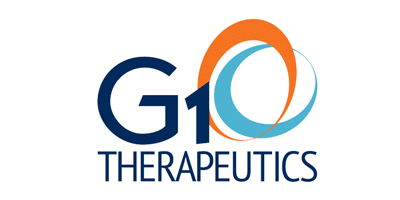
Research Triangle Park, N.C., April 29, 2019 (GLOBE NEWSWIRE) — G1 Therapeutics, Inc. (Nasdaq: GTHX), a clinical-stage oncology company, today provided a regulatory update on trilaciclib, a first-in-class myelopreservation agent designed to protect the bone marrow from damage by chemotherapy and improve patient outcomes.
Based on written feedback from its end-of-Phase 2 meeting with the U.S. Food and Drug Administration (FDA) and discussions with European regulatory authorities, the company plans to submit marketing applications in the U.S. and Europe for trilaciclib for myelopreservation in small cell lung cancer (SCLC). These submissions will be based on currently available data from three randomized, double-blind, placebo-controlled SCLC clinical trials, as well as safety data collected across all completed and ongoing clinical trials.
“We are pleased with the feedback from our recent meetings with regulatory authorities. We look forward to continuing a collaborative dialogue regarding the marketing applications, as well as discussing further clinical development of trilaciclib,” said Raj Malik, M.D., Chief Medical Officer. “We believe trilaciclib represents an important advance in the care of SCLC patients. We will also move forward with a robust development program to evaluate trilaciclib in multiple tumor types and chemotherapy regimens.”
G1 will request a pre-New Drug Application (NDA) meeting with the FDA and anticipates it will be scheduled later this year. The company will provide further details regarding the NDA submission and timeline following that meeting. The company plans to submit a Marketing Authorization Application (MAA) to the European Medicines Agency (EMA) subsequent to an NDA filing.
Chemotherapy is an effective and important weapon against cancer. However, chemotherapy does not differentiate between healthy cells and cancer cells and kills both, including important stem cells in the bone marrow that produce white blood cells, red blood cells and platelets. This chemotherapy-induced bone marrow damage is known as myelosuppression. When white blood cells, red blood cells and platelets become depleted, chemotherapy patients are at increased risk of infection, experience anemia and fatigue, and are at increased risk of bleeding. Myelosuppression often requires the administration of rescue interventions such as growth factors and blood or platelet transfusions, and may also result in chemotherapy dose delays and reductions.
“In clinical trials, trilaciclib demonstrated the ability to protect bone marrow from chemotherapy damage and meaningfully reduced the need for supportive care interventions, such as G-CSF and transfusions,” said Jared Weiss, M.D., Associate Professor, University of North Carolina Lineberger Comprehensive Cancer Center, and trilaciclib clinical trial investigator. “By providing a proactive approach to reduce myelosuppression, trilaciclib improves the patient experience during chemotherapy treatment, reducing side effects and the need for associated interventions commonly given to treat them.”
About Trilaciclib
Trilaciclib is a first-in-class myelopreservation agent designed to protect the bone marrow from damage by chemotherapy and improve patient outcomes. Trilaciclib is being evaluated in four randomized Phase 2 clinical trials; G1 reported positive results from all these trials in 2018.
About G1 Therapeutics
G1 Therapeutics, Inc. is a clinical-stage biopharmaceutical company focused on the discovery, development and delivery of innovative therapies that improve the lives of those affected by cancer. The company is advancing three clinical-stage programs. Trilaciclib and lerociclib are designed to enable more effective combination treatment strategies and improve patient outcomes across multiple oncology indications. G1T48 is a potential best-in-class oral selective estrogen receptor degrader (SERD) for the treatment of ER+ breast cancer. G1 also has an active discovery program focused on cyclin-dependent kinase targets.
Forward-Looking
Statements
This press release contains forward-looking statements within the meaning of
the Private Securities Litigation Reform Act of 1995. Words such as
“may,” “will,” “expect,” “plan,”
“anticipate,” “estimate,” “intend” and similar
expressions (as well as other words or expressions referencing future events,
conditions or circumstances) are intended to identify forward-looking
statements. Forward-looking statements in this news release include, but are
not limited to, the therapeutic potential of trilaciclib, lerociclib and G1T48
and the timing for next steps with regard to the trilaciclib marketing applications,
and are based on the Company’s expectations and assumptions as of the date of
this press release. Each of these forward-looking statements involves risks and
uncertainties. Factors that may cause the Company’s actual results to differ
from those expressed or implied in the forward-looking statements in this press
release are discussed in the Company’s filings with the U.S. Securities and
Exchange Commission, including the “Risk Factors” sections contained
therein and include, but are not limited to, the Company’s ability to complete
clinical trials for, obtain approvals for and commercialize any of its product
candidates; the Company’s initial success in ongoing clinical trials may not be
indicative of results obtained when these trials are completed or in later
stage trials; the inherent uncertainties associated with developing new
products or technologies and operating as a development-stage company; the
Company’s development of a CDK4/6 inhibitor to reduce chemotherapy-induced
myelosuppression is novel, unproven and rapidly evolving and may never lead to
a marketable product; and market conditions. Except as required by law, the
Company assumes no obligation to update any forward-looking statements
contained herein to reflect any change in expectations, even as new information
becomes available.
Contact:
Jeff Macdonald
Head of Investor Relations/Public Relations
919-907-1944
jmacdonald@g1therapeutics.com
Related Article: G1 Therapeutics to Report Myelopreservation Data from Randomized Phase 2 Trial